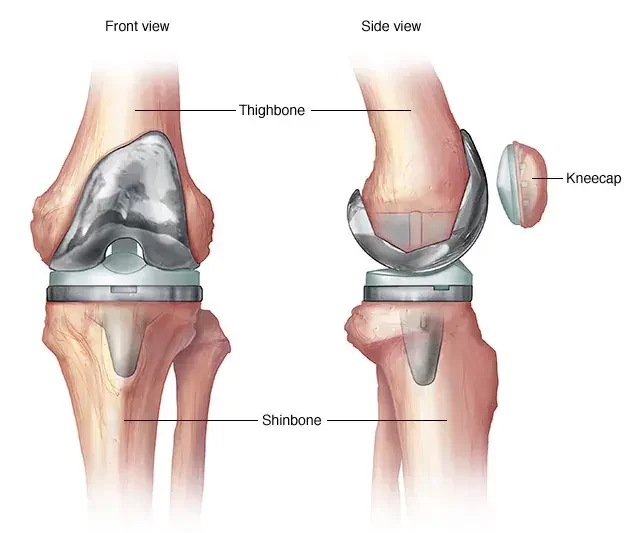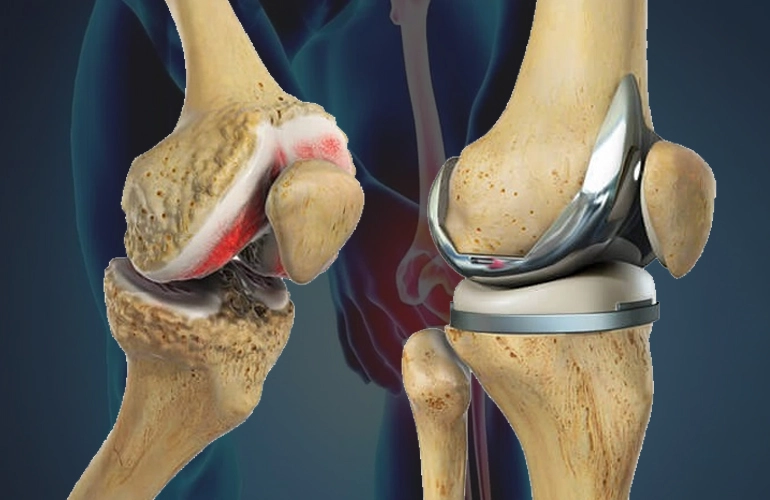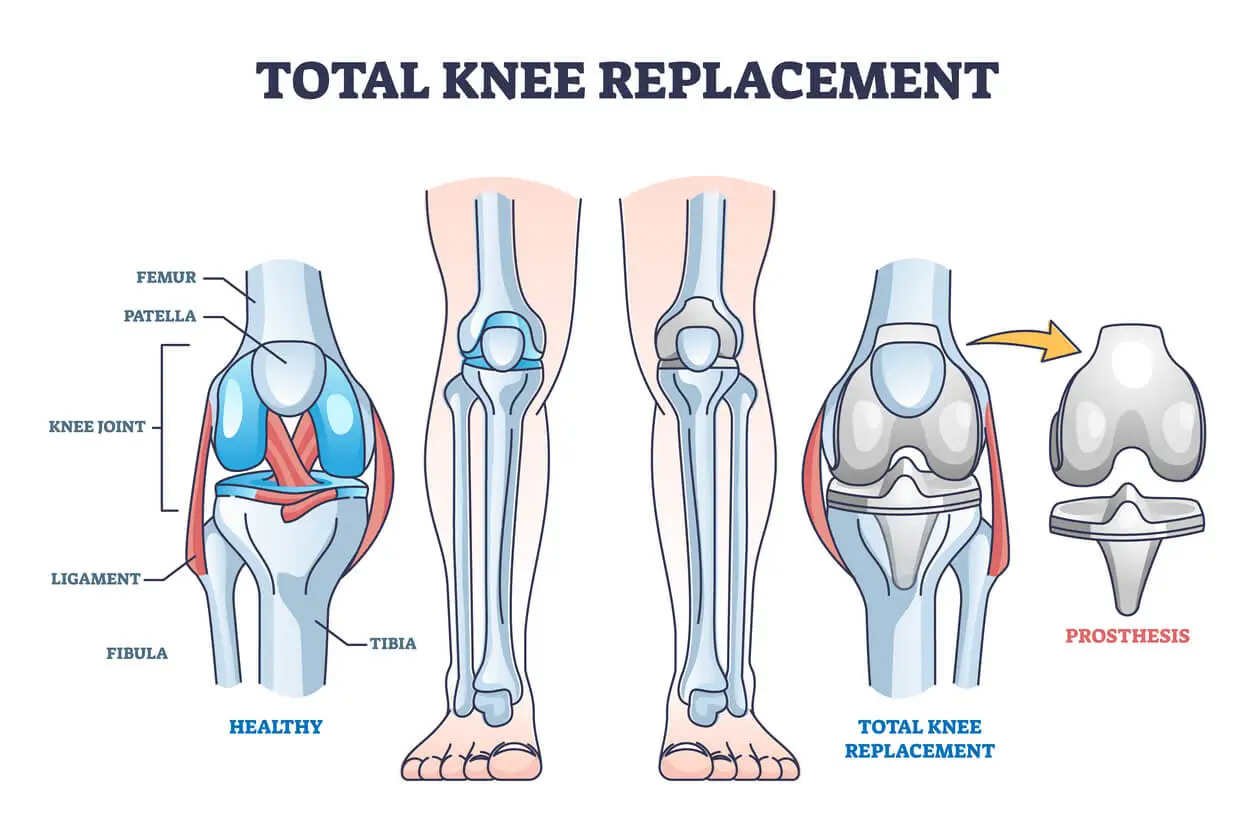Total Knee Replacement Surgery Cost in India | Affordable & High-Quality Care (2025)

Table of Contents
- 1 Total Knee Replacement Surgery Cost in India | Affordable & High-Quality Care (2025)
- 1.1 Understanding Total Knee Replacement Surgery: A Comprehensive Guide
- 1.2 The difference between partial and total knee replacement.
- 1.3 Risks involved in Knee Replacement Surgery and how India ensures high success rates.
- 1.4 Why Choose Sefiroth Tour Medica?
- 1.5 Frequently Asked Questions About Total Knee Replacement Surgery Cost in India
Understanding Total Knee Replacement Surgery: A Comprehensive Guide
Knee pain can significantly impact your quality of life, making everyday activities like walking, climbing stairs, or even sitting down a challenge. For individuals suffering from severe knee damage, often caused by osteoarthritis, rheumatoid arthritis, or injury, Total Knee Replacement Surgery Cost in India offers a viable solution. This article provides comprehensive information about the procedure, its costs, benefits, risks, and why India is a popular destination for this life-altering surgery.
What is Total Knee Replacement Surgery, and when is it needed?
Total knee replacement (TKR), also known as knee arthroplasty, is a surgical procedure where the damaged surfaces of the knee joint are replaced with artificial implants. The knee joint is a complex structure comprising the lower end of the femur (thighbone), the upper end of the tibia (shinbone), and the patella (kneecap). Arthritis, a degenerative joint disease, gradually wears away the cartilage that cushions these bones, leading to pain, stiffness, and limited mobility. Other conditions, such as traumatic injuries, can also cause severe damage to the knee joint.
You might need a knee replacement if:
- You experience severe knee pain that interferes with daily activities, even at rest.
- Pain persists despite conservative treatments like medication, physical therapy, and injections.
- You have significant stiffness, making it difficult to bend or straighten your knee.
- X-rays reveal severe damage to the knee joint.
- You’re unable to participate in activities you enjoy due to knee pain. This loss of functionality is a significant driver for seeking surgical intervention. The goal is to regain mobility and improve the quality of life. A thorough examination and diagnostic imaging, such as X-rays, are crucial for accurate assessment and determining the suitability of TKR.
The difference between partial and total knee replacement.
While both procedures involve replacing damaged cartilage with artificial components, they differ in their scope. In a total knee replacement surgery, the entire damaged joint surface is replaced. This includes the ends of the femur and tibia, and sometimes the undersurface of the patella. The surgeon resurfaces the bone and then secures the implant components to the prepared bone surfaces. This comprehensive approach is ideal for patients with widespread joint damage.
A partial knee replacement, also called unicompartmental knee replacement, involves replacing only the damaged portion of the knee joint, leaving the healthy cartilage intact. Partial knee replacements are typically considered when arthritis affects only one side of the knee. This minimally invasive approach can offer a faster recovery time and may preserve more of the patient’s natural joint structure. Determining the best course of action depends on the extent and location of the damage.

Factors affecting Total Knee Replacement Surgery Cost in India
The Knee Replacement operation cost in India varies depending on several factors:
- Hospital Location and Surgeon Expertise: The cost of surgery is often higher in metropolitan cities and prestigious hospitals that have advanced technology and highly experienced surgeons. The experience and qualifications of the orthopedic surgeon also affect the overall cost. Surgeons with extensive experience in TKR procedures may command higher fees due to their expertise and success rates. Furthermore, the reputation and infrastructure of the hospital significantly impact the cost.
- Type of Implant Used (metal, ceramic, etc.): Knee implants are made from various materials. The most common are metal alloys, but ceramic and polyethylene implants are also used. The choice of implant depends on the patient’s age, activity level, and the surgeon’s preference. The material and design of the implant influence the cost. Advanced implants with enhanced durability and biomechanical properties may cost more. The surgeon will recommend the most suitable implant to meet the specific needs and lifestyle of the patient. Patient-specific implants, custom-designed for unique knee anatomy, may also be available and would affect the overall cost.
- Pre- and Post-Operative Care Expenses: The overall cost includes pre-operative assessments (blood tests, X-rays, etc.), the cost of the hospital stay, the surgical procedure, anesthesia, medications, and post-operative rehabilitation (physical therapy). The length of your hospital stay and the intensity of your rehabilitation program will impact the final cost. Comprehensive pre-operative assessments are critical to ensuring the patient is fit for surgery. Post-operative care, including physical therapy, pain management, and follow-up appointments, is vital for a successful outcome.

Knee Replacement Surgery in India
India has emerged as a leading destination for medical tourism, particularly for orthopedic procedures. Compared to many developed nations, the Knee Replacement operation cost in India is significantly lower, offering substantial cost savings for international patients. The availability of skilled surgeons, state-of-the-art technology, and internationally accredited hospitals further enhances its appeal. This attracts a global patient base seeking high-quality care at an affordable price. The competitive market and lower overhead costs in India contribute to this cost advantage.
India vs. Global Pricing
The Knee Replacement operation cost in the United States can range from $45,000 to $70,000 or more, excluding rehabilitation costs. In the United Kingdom, the cost can be between $18,000 to $25,000 depending on the type of surgery and location of the hospital. In comparison, the Total Knee Replacement Surgery Cost in India typically ranges from $3,500 to $7,500, encompassing all aspects of treatment, including the surgeon’s fees, hospital charges, implants, and post-operative care. This significant difference in price makes India an attractive option for patients seeking affordable and high-quality healthcare. The substantial cost savings are a major factor driving the popularity of medical tourism to India.
| Country | Country Approximate Cost (in USD) |
|---|---|
| India | $3,500 - $7,500 |
| United States | $45,000 - $70,000 |
| United Kingdom | $18,000 - $25,000 |
| Singapore | $13,000 - $20,000 |
| Australia | $15,000 - $22,000 |
Risks involved in Knee Replacement Surgery and how India ensures high success rates.
Like any surgical procedure, knee replacement surgery risks exist. These can include:
- Infection: Infections can occur at the surgical site or within the implant itself.
- Blood clots: Blood clots can form in the legs and potentially travel to the lungs (pulmonary embolism).
- Nerve damage: Damage to nerves around the knee can lead to numbness, weakness, or pain.
- Implant loosening or failure: Over time, the implant components can loosen or wear out, requiring revision surgery.
- Stiffness or limited range of motion: Scar tissue formation can restrict the knee’s movement.
- Pain: Persistent pain can occur even after a successful surgery.
- Fractures around the implant: Bone fractures can occur during or after the surgery.
However, India has implemented measures to minimize these risks and ensure high success rates. These include:
- Experienced Surgeons: Indian hospitals boast highly qualified and experienced orthopedic surgeons with expertise in TKR, often trained in the best institutions worldwide. Continuous professional development and specialized training ensure surgeons are at the forefront of surgical techniques and advancements.
- Advanced Technology: Many hospitals utilize cutting-edge technology, including computer-assisted surgery and minimally invasive techniques, to enhance precision and improve outcomes. This includes the use of robotic-assisted surgery, which offers enhanced precision and accuracy.
- Stringent Infection Control: Strict protocols are followed to minimize the risk of infection, including sterile operating rooms and pre-operative antibiotic administration. Hospitals adhere to international standards for sterilization and hygiene to minimize the risk of surgical site infections.
- Comprehensive Rehabilitation: Hospitals provide comprehensive post-operative rehabilitation programs to facilitate a speedy recovery, restore mobility, and reduce complications. This includes physical therapy, pain management, and patient education.
- Quality Implants: Hospitals use high-quality implants from reputable manufacturers that meet international standards. Hospitals typically source implants from leading global manufacturers to ensure durability and performance.
Why India is a preferred destination for knee replacement surgery procedures.
India’s growing reputation as a medical tourism hub stems from a combination of factors:
- Affordability: The significantly lower Knee Replacement operation cost makes it financially accessible for patients from around the world. The price difference compared to other developed nations is a major attraction, making quality healthcare available to more people.
- High-Quality Care: India offers world-class medical facilities and highly skilled medical professionals. Many hospitals are accredited by international organizations, ensuring adherence to global standards of care.
- Advanced Technology: Indian hospitals are equipped with the latest medical technology, ensuring accurate diagnosis and effective treatments. This includes advanced imaging techniques and minimally invasive surgical approaches.
- English-Speaking Staff: Many medical professionals and hospital staff are fluent in English, making communication easy for international patients. This helps ensure clear and effective communication throughout the treatment process.
- Cultural Experience: India offers a rich cultural experience, allowing patients to combine medical treatment with travel and exploration. Medical tourism allows patients to combine treatment with a unique travel experience.

Why Choose Sefiroth Tour Medica?
At Sefiroth Tour Medica, we understand the importance of making informed decisions about your healthcare. We are committed to providing affordable, high-quality Knee Replacement Surgery in India for international patients. We offer a comprehensive range of services designed to make your medical journey smooth, comfortable, and successful. We prioritize patient care and strive to deliver the best possible outcomes.
- Affordable, high-quality Knee Replacement Surgery in India: We connect you with top-rated hospitals and surgeons offering cost-effective treatment options without compromising on quality. We work to ensure you receive world-class care at a price that fits your budget.
- Personalized treatment plans tailored for international patients: We understand that each patient’s needs are unique. We work closely with you to create a customized treatment plan that meets your specific requirements and expectations. Our personalized approach takes into account your medical history, lifestyle, and preferences.
- Visa and travel assistance for seamless medical travel: We provide comprehensive assistance with visa applications, travel arrangements, and airport transfers, ensuring a hassle-free travel experience. We handle all the logistical aspects, so you can focus on your health.
- Top hospitals and experienced orthopedic surgeons in India: We partner with leading hospitals accredited by international organizations, and our surgeons are highly skilled and experienced in performing knee replacement surgeries. We only work with the best facilities and medical professionals.
- Post-treatment care and follow-ups for a smooth recovery: We provide continuous support and follow-up care during your recovery, ensuring you receive the support you need to achieve optimal results. We are dedicated to supporting your recovery and overall well-being.
- 24/7 consultation and support services: Our dedicated team is available around the clock to answer your questions, address your concerns, and provide assistance throughout your medical journey. We offer round-the-clock support to patients, ensuring they feel safe and secure.
If you are considering Total Knee Replacement Surgery Cost in India, contact us today to learn more about how we can help you regain your mobility and improve your quality of life.
Contact Us:
Office Hours: 24/7 (Available for consultations and inquiries)
Phone: +91-7387686639
Email: info@sefirothtourmedica.com

Frequently Asked Questions About Total Knee Replacement Surgery Cost in India
The cost of Total Knee Replacement Surgery in India can vary significantly depending on several factors. On average, the Total Knee Replacement Surgery Cost in India ranges from $3,500 to $7,500. This cost includes the surgeon's fees, hospital charges, the cost of the implant, and post-operative care. Factors such as the type of implant used, the location and reputation of the hospital, and the experience of the surgeon can influence the overall cost. For instance, Hospitals in metropolitan cities like Delhi, Mumbai, and Bangalore might charge more compared to smaller cities. However, despite these variations, the overall Knee Replacement operation cost in India remains significantly lower than in many other countries, making it an attractive option for international patients.
Several factors can affect the cost of knee replacement in India. These include the type of implant used, with ceramic or custom-made implants costing more than standard metal alloys. The location of the hospital also plays a role, with hospitals in major cities typically charging more than those in smaller towns. The surgeon's expertise and reputation can also influence the cost, as more experienced surgeons may charge higher fees. Additionally, the cost of pre-operative tests, hospital stay, and post-operative rehabilitation can vary, impacting the overall Knee Replacement operation cost. Insurance coverage, if applicable, can also affect out-of-pocket expenses. It's essential for patients to discuss these factors with their healthcare provider to get a comprehensive understanding of the costs involved.
The duration of knee replacement surgery can vary depending on several factors, including the complexity of the procedure, the patient's overall health, and the surgeon's experience. Generally, a knee replacement surgery procedure can take anywhere from 1 to 3 hours to complete. This time frame includes preparation, the surgical procedure itself, and recovery from anesthesia. In some cases, if the surgery is more complex or if both knees are being replaced, the operation can take longer. The surgeon will provide a more accurate estimate of the surgery time based on the individual patient's needs. It's also worth noting that with advancements in surgical techniques and technology, some knee replacement surgeries can now be performed on an outpatient basis, reducing the overall time spent in the hospital.
The success rate of knee replacement surgery in India is quite high, with most patients experiencing significant improvement in their quality of life. Success rates can vary depending on the surgeon, hospital, and patient factors, but generally, more than 90% of patients report satisfaction with their surgery. Factors contributing to the success include the surgeon's expertise, the type of implant used, and the patient's adherence to post-operative rehabilitation protocols. Like any surgical procedure, there are risks involved, such as infection, blood clots, and implant failure, but these are relatively rare. The success rate can also depend on the patient's overall health, age, and pre-existing conditions. Therefore, it's crucial for patients to choose a reputable hospital and an experienced surgeon to maximize the chances of a successful outcome.
The recovery period for knee replacement surgery can vary from person to person but generally includes several phases. Immediately after surgery, patients typically spend a few days in the hospital for initial recovery and to ensure there are no complications. Once discharged, patients usually require several weeks of rehabilitation, which includes physical therapy to regain strength and mobility in the knee. The initial recovery period, where patients can resume light activities, can take about 6 to 12 weeks. However, full recovery, where the knee is strong enough for more strenuous activities, can take up to 6 months to a year. Factors such as the patient's age, overall health, and adherence to rehabilitation protocols can influence the recovery time. It's also important for patients to follow their healthcare provider's advice on post-operative care and rehabilitation to ensure a smooth and effective recovery.
Like any surgical procedure, knee replacement surgery involves certain risks. The most common risks include infection, blood clots, and nerve damage. There is also a risk of the implant loosening or failing over time, which may require revision surgery. Additionally, some patients may experience stiffness or limited range of motion in the knee after surgery. These risks, while possible, are relatively rare, and most patients do not experience significant complications. The risk of infection can be minimized with proper wound care and the use of antibiotics. Blood clots can be prevented with medication and early mobilization. Patients should discuss these potential risks with their surgeon to understand how they can be mitigated and what signs to look out for post-operatively.
Yes, knee replacement surgery in India is generally considered safe for international patients. India has a well-developed healthcare system with many hospitals that meet international standards. Many Indian hospitals are accredited by organizations such as the Joint Commission International (JCI) or the National Accreditation Board for Hospitals & Healthcare Providers (NABH), ensuring they adhere to global best practices in patient care and safety. Additionally, many Indian surgeons have received training in countries like the US and the UK, and they are well-versed in the latest techniques and technologies. However, as with any medical procedure, it's essential for international patients to do their research, choose a reputable hospital, and ensure their surgeon has extensive experience with knee replacement surgeries. This includes checking the hospital's and surgeon's credentials, reading patient reviews, and asking about their experience with international patients.
Preparing for knee replacement surgery involves several steps to ensure a smooth and successful procedure. Patients should start by discussing their medications with their doctor, as some may need to be stopped before surgery. They should also inform their doctor about any allergies or sensitivities. Physical conditioning before surgery can help with recovery, so patients are often advised to engage in light exercises as recommended by their healthcare provider. Additionally, patients should plan for someone to help them at home for a few weeks after surgery, as they will have limited mobility. It's also a good idea to prepare the home environment by removing tripping hazards and installing handrails in strategic locations. Patients should also follow a healthy diet and stop smoking to improve their overall health and reduce the risk of complications.
Yes, it is possible to replace both knees at the same time, a procedure known as bilateral knee replacement. This approach can be beneficial for patients who have severe arthritis in both knees, as it allows them to undergo a single surgery and rehabilitation period. However, this procedure is typically recommended for patients who are in good overall health and can tolerate the longer surgery and recovery time. The decision to perform bilateral knee replacement should be made in consultation with an orthopedic surgeon, who can assess the patient's individual situation and provide guidance on the best approach. Bilateral knee replacement can offer the advantage of a single recovery period but also increases the risk of complications, such as infection and blood clots. Therefore, it's a decision that should be made carefully, considering all the potential benefits and risks.
Post-operative care after knee replacement surgery is critical for a successful recovery. Immediately after surgery, patients will be monitored in the hospital for any signs of complications, such as infection or blood clots. Once discharged, patients will need to follow a rehabilitation program that includes physical therapy to regain strength and mobility in the knee. This program will be tailored to the patient's individual needs and may include exercises to improve range of motion, strengthen the muscles around the knee, and improve balance and walking. Patients will also need to follow instructions for wound care and pain management. Regular follow-up appointments with the surgeon are necessary to monitor the healing process and remove any sutures or staples. Adherence to the post-operative care plan is crucial for minimizing the risk of complications and achieving the best possible outcomes from the surgery.
Choosing the right hospital and surgeon for knee replacement surgery in India is a critical decision that can significantly impact the outcome of the procedure. Patients should start by researching hospitals that are accredited by international organizations, such as the Joint Commission International (JCI), and have a good reputation for orthopedic care. They should also look for surgeons who are board-certified and have extensive experience in performing knee replacement surgeries. Checking patient reviews and testimonials can provide valuable insights into the quality of care and patient satisfaction. Additionally, patients should consider factors such as the hospital's infrastructure, the availability of advanced technology, and the quality of post-operative care. It's also a good idea to ask questions during the initial consultation, such as the surgeon's experience with the specific type of knee replacement surgery, the expected outcomes, and the risks involved. By doing thorough research and asking the right questions, patients can make an informed decision and choose a hospital and surgeon that meet their needs and ensure a successful knee replacement surgery.
Knee replacement surgery offers several benefits for patients suffering from severe knee arthritis or other knee conditions. The primary benefit is the significant reduction in pain, which can greatly improve the patient's quality of life. Additionally, knee replacement surgery can restore mobility and function, allowing patients to engage in activities they may have had to give up due to their condition. The surgery can also correct deformities, such as bowlegged or knock-kneed conditions, and improve the overall alignment of the knee. With the advancement in technology and surgical techniques, the longevity of knee implants has increased, with many lasting 15 to 20 years or more. For many patients, knee replacement surgery is a life-changing procedure that can help them return to their normal activities and enjoy life without the limitations of knee pain and stiffness.
The longevity of knee replacement implants can vary depending on several factors, including the type of implant, the patient's age, weight, and activity level, and the quality of the surgical procedure. On average, a well-placed knee implant can last for 15 to 20 years or more. However, some implants may last longer or shorter periods. Factors such as wear and tear, loosening of the implant, or infection can reduce the lifespan of the implant. Younger, more active patients may need revision surgery sooner than older, less active patients. Advances in implant design and materials are continually improving the durability and longevity of knee implants. It's essential for patients to follow their surgeon's recommendations for post-operative care and to attend follow-up appointments to monitor the condition of the implant and address any potential issues early on.
Yes, knee replacement surgery can be performed using minimally invasive techniques. These techniques involve smaller incisions and less tissue damage compared to traditional open surgery. Minimally invasive knee replacement surgery is designed to reduce trauma to the soft tissues, leading to less pain, less blood loss, and a quicker recovery. This approach can also result in smaller scars and less risk of infection. However, not all patients are candidates for minimally invasive surgery, and the decision to use this approach should be made in consultation with an orthopedic surgeon. The surgeon will assess the patient's overall health, the condition of the knee, and other factors to determine if minimally invasive knee replacement surgery is the best option. While this technique offers several benefits, it's crucial to weigh these against potential risks and complications, such as limited visibility for the surgeon, which can increase the difficulty of the procedure.
Yes, there are alternatives to knee replacement surgery, and the best course of action depends on the severity of the knee condition, the patient's overall health, and their personal preferences. For patients with mild to moderate arthritis, conservative treatments such as physical therapy, steroid injections, and lifestyle modifications may be recommended. In some cases, procedures like arthroscopy or osteotomy may be considered. Arthroscopy involves the use of a small camera and surgical tools to repair or remove damaged tissue, while osteotomy involves cutting and realigning the bones to reduce stress on the damaged joint. These alternatives can delay the need for knee replacement surgery or, in some cases, may be sufficient to manage symptoms without the need for more invasive surgery. However, for patients with severe arthritis or those who have not responded to conservative treatments, knee replacement surgery may be the most effective option to restore function and alleviate pain.
